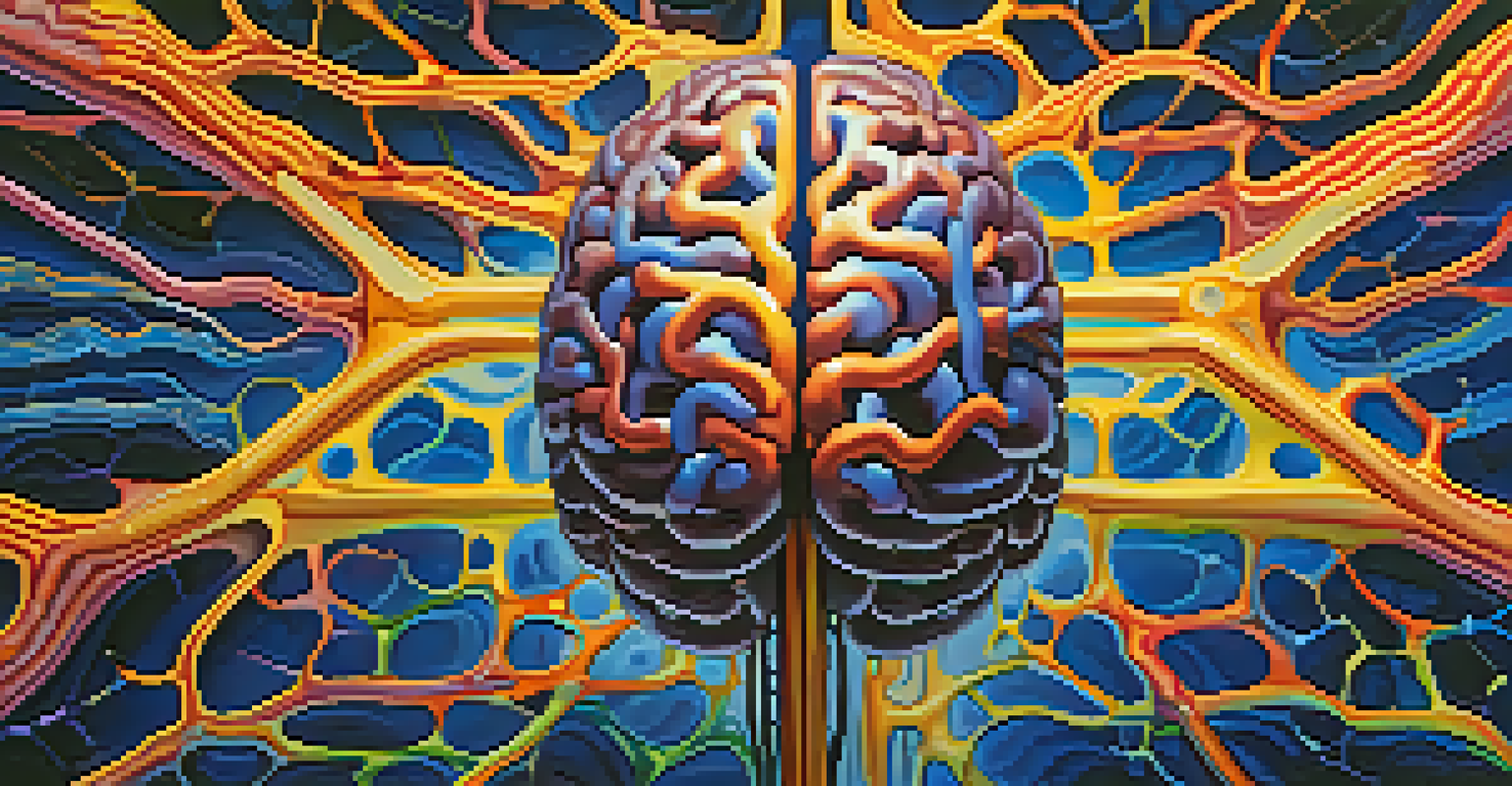The Connection Between Hallucinogens and Anxiety Responses

Understanding Hallucinogens and Their Effects on the Mind
Hallucinogens are substances that alter perception, mood, and cognitive processes. They include drugs like LSD, psilocybin, and DMT, which can induce vivid visual and auditory experiences. For many, these compounds lead to profound insights or spiritual experiences, but they can also evoke strong emotional reactions, including anxiety.
The mind is everything. What you think you become.
The way hallucinogens interact with the brain's serotonin receptors is key to understanding their effects. Serotonin is a neurotransmitter that plays a significant role in regulating mood and anxiety. When hallucinogens stimulate these receptors, they can create a sense of euphoria or lead to heightened anxiety, depending on the individual's mindset and environment.
This duality of effects makes hallucinogens a fascinating area of study, particularly for those seeking alternative treatments for anxiety disorders. Understanding how these substances can both alleviate and exacerbate anxiety responses can provide valuable insights into their potential therapeutic applications.
The Role of Set and Setting in Hallucinogen Experiences
One of the critical factors influencing the effects of hallucinogens is 'set and setting.' 'Set' refers to the individual's mindset, while 'setting' pertains to the physical and social environment in which the experience occurs. A supportive and calm environment can enhance positive outcomes, while a chaotic or uncomfortable setting can lead to anxiety and distress.

For instance, someone taking psilocybin in a safe, familiar space surrounded by friends may experience profound joy and connection. Conversely, the same individual in a crowded, noisy environment might feel overwhelmed and anxious. This underscores the importance of preparation and intentionality when engaging with these substances.
Hallucinogens and Mindset Matters
The effects of hallucinogens are significantly influenced by an individual's mindset and the environment in which they are used.
Research suggests that by optimizing set and setting, individuals can potentially harness the therapeutic benefits of hallucinogens while minimizing adverse reactions. This understanding is crucial for those exploring these substances for therapeutic reasons, as it highlights the need for careful planning.
How Hallucinogens Can Reduce Anxiety Symptoms
Interestingly, some studies have shown that hallucinogens can help reduce symptoms of anxiety, particularly in clinical settings. For example, psilocybin has been studied for its potential to alleviate anxiety in patients facing terminal illnesses. The experience often leads to a significant reduction in existential anxiety, allowing patients to approach their situations with a sense of peace.
The greatest discovery of my generation is that a human being can alter his life by altering his attitudes.
The mechanisms behind this effect may involve changes in brain connectivity, promoting feelings of interconnectedness and reducing fear. As individuals experience a shift in perspective, they may find relief from anxiety, viewing their circumstances through a different lens. This can be particularly beneficial in therapeutic settings.
However, it's important to note that while some individuals may experience anxiety relief, others may find that hallucinogens exacerbate their symptoms. This variability highlights the need for careful consideration and professional guidance when using these substances as a treatment for anxiety.
The Risks of Hallucinogens and Anxiety Reactions
Despite the potential benefits, using hallucinogens isn't without risks, especially for those with pre-existing anxiety disorders. Some individuals may experience heightened anxiety or panic attacks during their trip, a reaction that can be both frightening and disorienting. These adverse responses can lead to lasting psychological effects.
Moreover, the unpredictability of hallucinogen experiences means that individuals may not always have control over their emotional responses. For those already struggling with anxiety, this unpredictability can exacerbate feelings of vulnerability. It's crucial to approach these substances with caution, particularly for individuals with a history of anxiety or other mental health issues.
Therapeutic Potential for Anxiety
Research indicates that hallucinogens like psilocybin may reduce anxiety symptoms, particularly in controlled therapeutic settings.
Education about these risks and open conversations with mental health professionals can help individuals make informed decisions about using hallucinogens. Understanding one's mental health history and current emotional state can play a significant role in minimizing potential negative outcomes.
Exploring Therapeutic Uses of Hallucinogens for Anxiety
In recent years, there has been a resurgence of interest in the therapeutic potential of hallucinogens for treating anxiety disorders. Clinical trials have shown promising results, suggesting that substances like psilocybin and MDMA can lead to significant reductions in anxiety when administered in controlled settings. This has sparked a wave of research aimed at understanding the mechanisms behind these effects.
Therapists often combine hallucinogen use with psychotherapy, allowing patients to confront and process their anxiety in a supportive environment. This approach can facilitate breakthroughs in treatment, enabling individuals to address deep-seated fears and anxieties that traditional therapies may not reach. The combination of the substance and therapeutic support creates a unique opportunity for healing.
As research continues, the idea of integrating hallucinogens into mainstream mental health treatment grows more viable. This could revolutionize how we approach anxiety and other mental health conditions, providing new avenues for relief where conventional methods have fallen short.
Personal Accounts: Hallucinogens and Anxiety Experiences
Personal experiences with hallucinogens can vary widely, especially regarding anxiety responses. Some individuals report transformative experiences that lead to lasting reductions in anxiety, while others recount trips filled with fear and distress. These narratives highlight the subjective nature of hallucinogen effects and the importance of individual context.
For example, one person may describe their first experience with LSD as a journey that opened their mind to new possibilities, helping them confront long-standing anxiety about their future. On the other hand, someone else might share a story of a panic attack triggered during a trip, reinforcing feelings of helplessness. These contrasting experiences underline the complex relationship between hallucinogens and anxiety.
Risks for Anxious Individuals
While hallucinogens can offer benefits, they also carry risks of heightened anxiety, especially for those with pre-existing mental health conditions.
These personal accounts can serve as valuable insights for others considering hallucinogen use, revealing both the potential benefits and risks involved. Understanding that each person's experience is unique can help individuals navigate their journeys with more awareness and care.
Conclusion: Navigating the Hallucinogen-Anxiety Connection
The connection between hallucinogens and anxiety responses is intricate and multifaceted. While these substances offer potential therapeutic benefits for some, they can also pose significant risks, particularly for those with pre-existing anxiety conditions. It’s essential to approach this topic with both curiosity and caution.
As research continues to unfold, it may pave the way for innovative treatments that harness the power of hallucinogens while prioritizing safety and well-being. For those interested in exploring this avenue, consulting with mental health professionals can provide essential guidance and support.

Ultimately, understanding the nuances of how hallucinogens affect anxiety can empower individuals to make informed choices about their mental health journey. Whether through therapeutic use or personal exploration, being aware of the potential outcomes can lead to more meaningful and beneficial experiences.